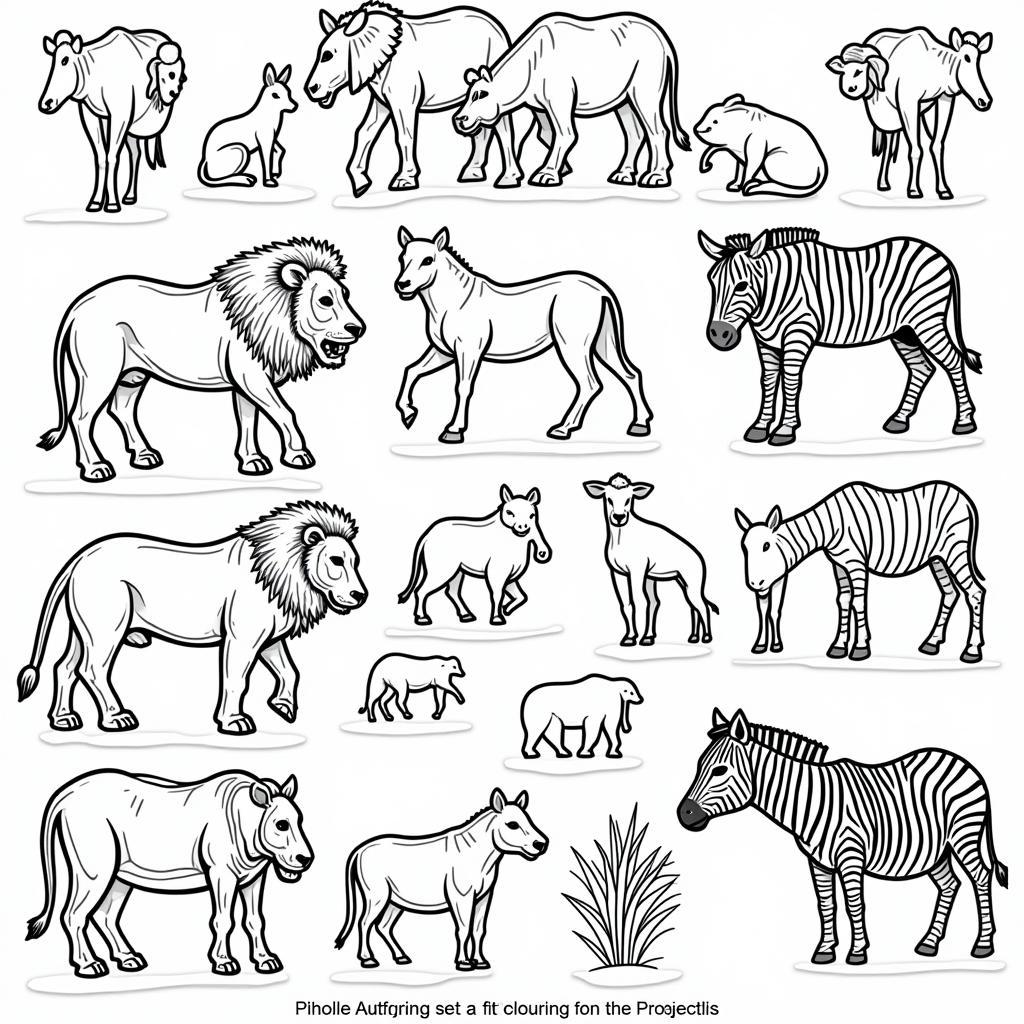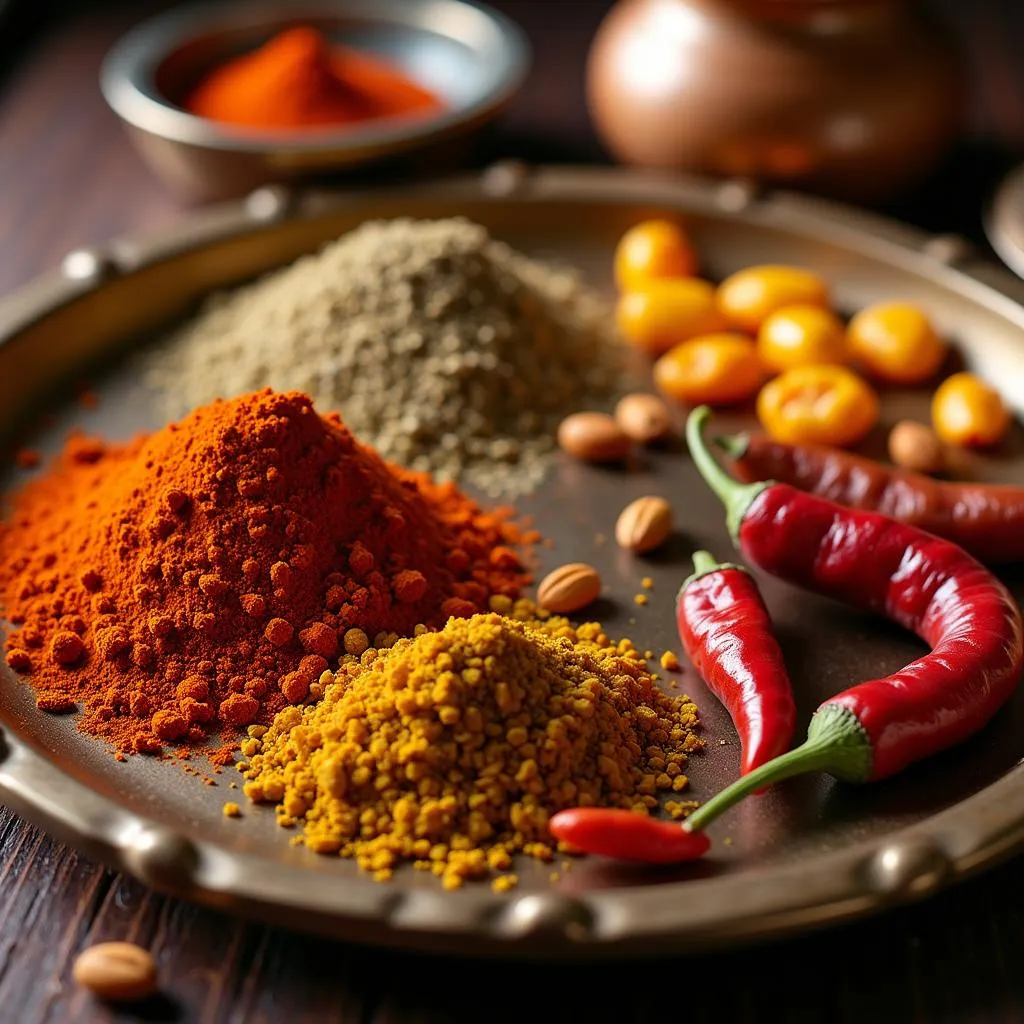The Ultimate Guide to African Grey Bird Food: What to Feed Your Feathered Friend
The African Grey parrot, known for its remarkable intelligence and ability to mimic human speech, is a popular choice for a companion bird. However, caring for an African Grey is a big responsibility, and their dietary needs are complex. Providing the right African Grey Bird Food is crucial for their overall health, well-being, and longevity. This comprehensive guide delves into everything you need to know about feeding your African Grey, from understanding their nutritional needs to creating a diverse and enriching diet.
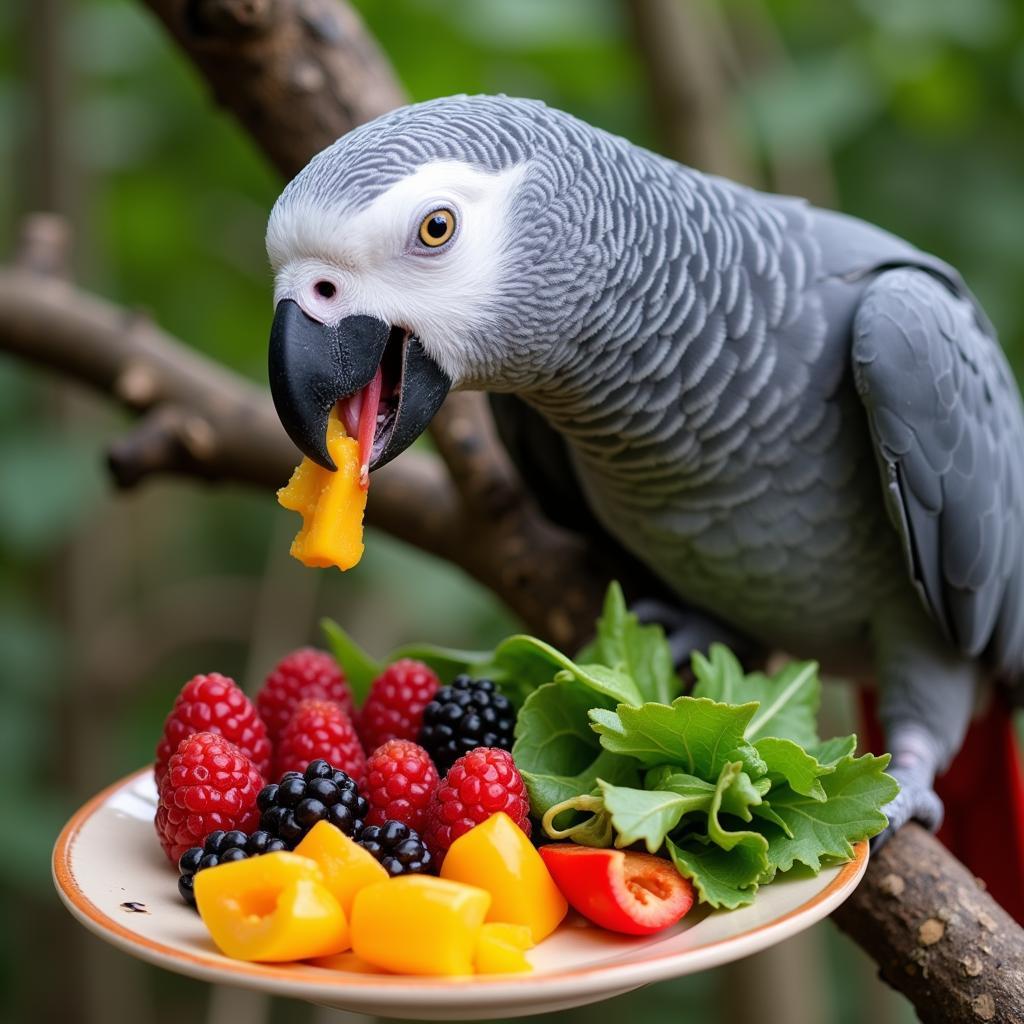 African Grey Parrot Enjoying a Healthy Meal
African Grey Parrot Enjoying a Healthy Meal
Why is a Balanced Diet Important for African Greys?
Just like humans, African Greys thrive on a balanced and varied diet that provides all the essential nutrients for optimal health. A diet lacking in essential vitamins, minerals, and other nutrients can lead to various health issues such as:
- Nutritional deficiencies: These can manifest in various ways, from poor feather quality and weak bones to a compromised immune system and even behavioral problems.
- Obesity: An all-seed diet, while seemingly convenient, is high in fat and can lead to obesity in African Greys, contributing to a range of health concerns.
- Liver problems: African Greys are prone to certain liver conditions, and a poor diet can exacerbate these issues.
- Reduced lifespan: Ultimately, a diet that doesn’t meet their nutritional needs can shorten your feathered friend’s lifespan.
Essential Components of African Grey Bird Food
A healthy African Grey diet should consist of a variety of foods, mimicking their natural foraging habits in the wild. Here’s a breakdown of the key components:
1. High-Quality Pelleted Diet (60-70%)
- Why it’s important: Pellets are specifically formulated to provide balanced nutrition, including vitamins, minerals, and protein, which can be lacking in other food sources.
- Choosing the right pellets: Look for pellets specifically designed for African Greys from reputable brands. Avoid pellets with artificial colors, flavors, and preservatives.
- Introducing pellets: If your African Grey is not accustomed to pellets, introduce them gradually, mixing them with their existing food.
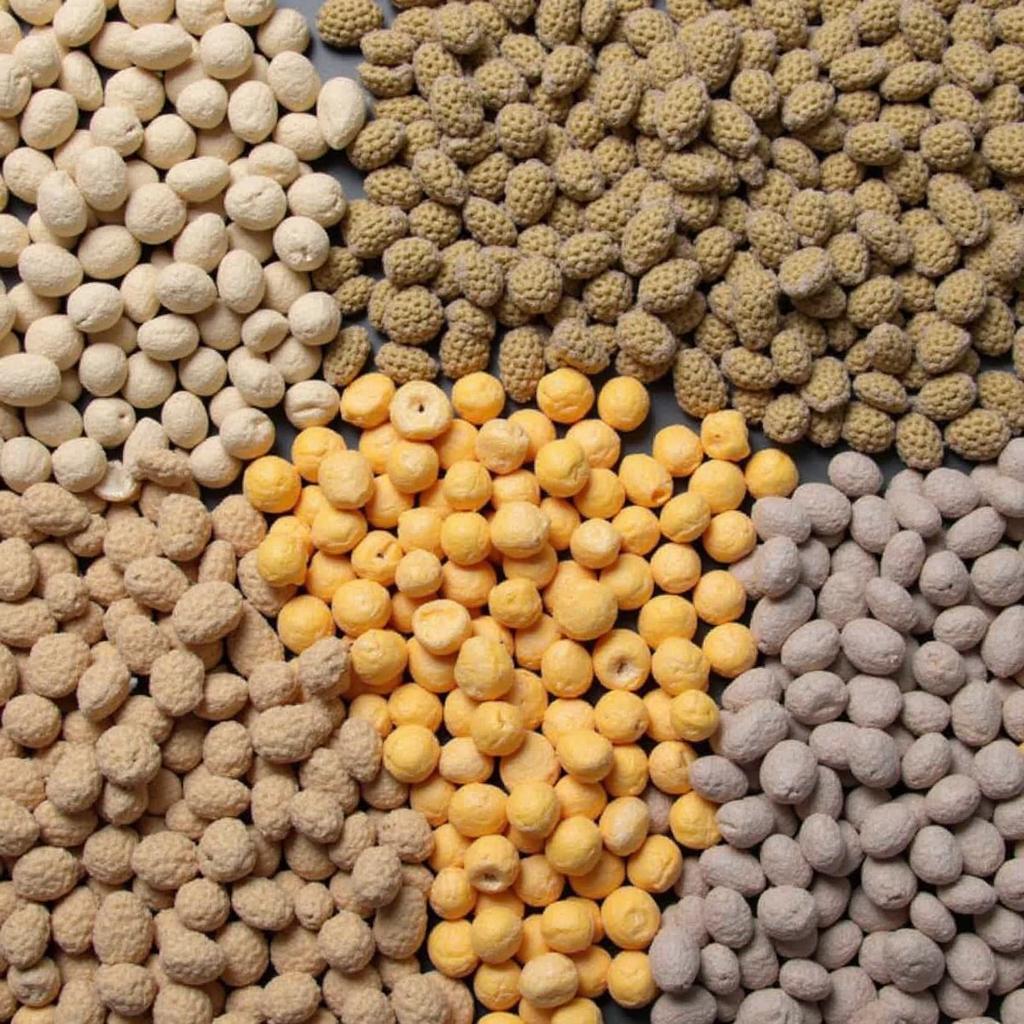 Variety of Parrot Pellets
Variety of Parrot Pellets
2. Fresh Fruits and Vegetables (20-30%)
- Benefits: Fruits and vegetables are packed with essential vitamins, minerals, and antioxidants, contributing to a strong immune system and overall health.
- Variety is key: Offer a wide variety of colorful fruits and vegetables such as:
- Fruits: Apples, bananas, berries (strawberries, blueberries, raspberries), grapes, mangoes, melons, oranges, papaya, peaches, pears.
- Vegetables: Broccoli, carrots, celery, corn on the cob, green beans, leafy greens (kale, spinach, romaine lettuce), peas, peppers, sweet potatoes, zucchini.
- Preparation: Wash all fruits and vegetables thoroughly to remove any pesticides. Chop them into bite-sized pieces suitable for your parrot’s beak.
3. Healthy Seeds and Nuts (5-10%)
- A treat, not a staple: While seeds and nuts are enjoyed by African Greys, they are high in fat and should be given in moderation as treats.
- Healthy options: Choose unsalted and unsweetened nuts and seeds like almonds, walnuts, pecans, pumpkin seeds, and sunflower seeds.
- Caution: Avoid avocado, as it can be toxic to parrots.
4. Cooked Grains and Legumes (5%)
- Additional nutrients: Cooked grains and legumes provide additional carbohydrates, fiber, and protein.
- Examples: Brown rice, quinoa, cooked beans (kidney, black, pinto), lentils.
- Cooking method: Cook thoroughly without salt, sugar, or any seasonings.
5. Clean, Fresh Water (Always Available)
- Hydration is crucial: Just like all living creatures, African Greys need access to clean, fresh water at all times for hydration.
- Water changes: Change the water in their bowl at least twice a day to prevent bacterial growth.
Foods to Avoid Feeding Your African Grey
Some foods can be toxic or harmful to African Greys and should be avoided entirely. These include:
- Avocado
- Chocolate
- Caffeine
- Alcohol
- Salt
- Sugar
- Processed foods
- Mushrooms
- Table scraps
Signs of a Healthy African Grey
A healthy African Grey will exhibit several signs, indicating that their diet is meeting their nutritional needs:
- Bright, clear eyes
- Smooth, shiny feathers
- Active and alert behavior
- Normal droppings
- Healthy weight
FAQs about African Grey Bird Food
1. How much should I feed my African Grey daily?
The amount of food your African Grey needs will vary depending on their age, activity level, and metabolism. A good rule of thumb is to offer 1/4 to 1/2 cup of food daily, in addition to fresh fruits, vegetables, and occasional treats.
2. What are some good sources of calcium for African Greys?
Calcium is crucial for strong bones and eggshell development. Good sources of calcium include dark leafy greens (kale, collard greens), broccoli, almonds, and calcium supplements specifically designed for birds.
3. Can I give my African Grey treats?
Yes, treats can be a great way to bond with your African Grey and provide mental stimulation. However, treats should be given in moderation and should not exceed 10% of their daily caloric intake.
4. What are some signs of nutritional deficiencies in African Greys?
Signs of nutritional deficiencies can be subtle but may include feather plucking, dull feathers, lethargy, poor appetite, weight loss, and susceptibility to illnesses.
5. Can I make my own African Grey bird food?
While it’s possible to make homemade bird food, it can be challenging to ensure a balanced and complete diet. If you choose to make your own, be sure to consult with an avian veterinarian for a balanced recipe.
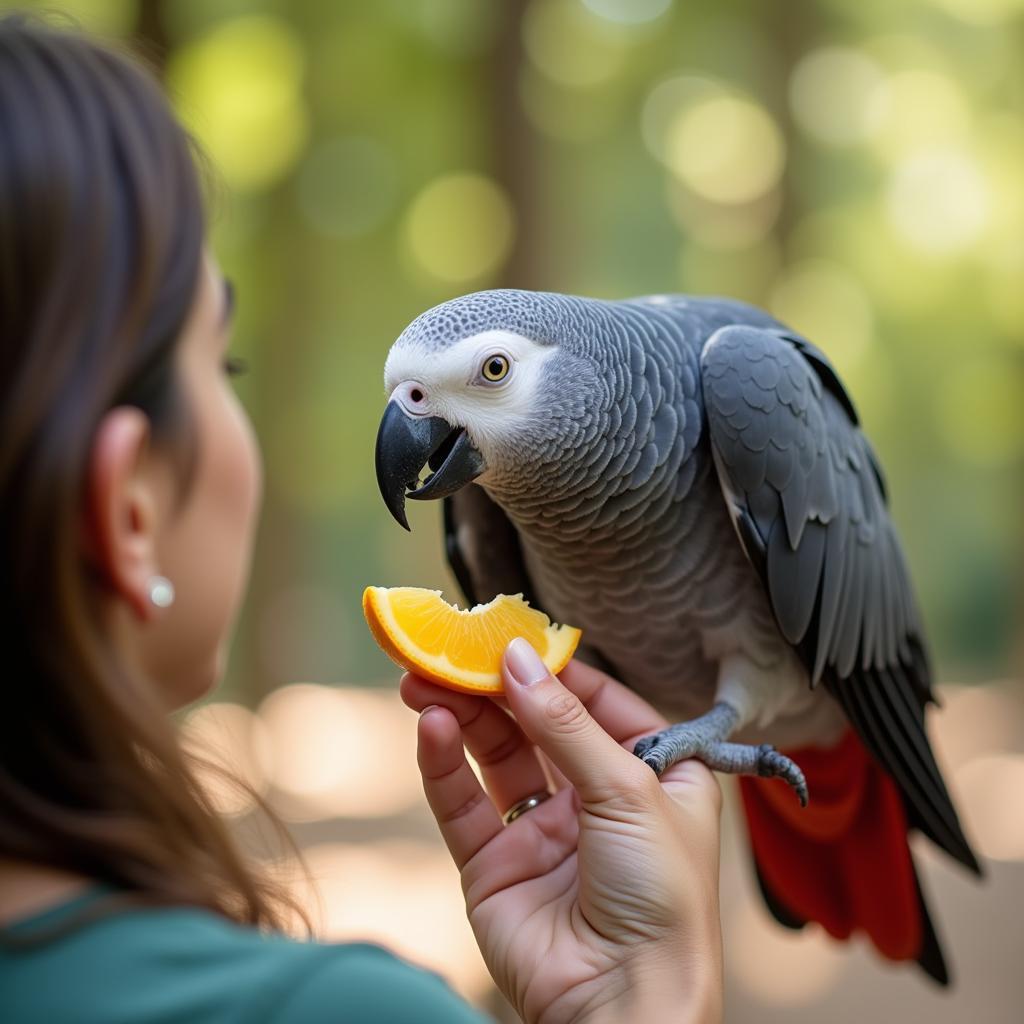 Bonding Over a Healthy Treat
Bonding Over a Healthy Treat
Conclusion
Providing a proper and balanced diet is fundamental to ensuring the health and happiness of your African Grey parrot. By incorporating a variety of african grey parrot food list, you can help your feathered friend live a long, healthy, and fulfilling life. Remember to consult with an avian veterinarian for personalized dietary recommendations and to address any concerns about your African Grey’s health and well-being. For more insights into caring for your African Grey, explore other informative articles on our website, such as “african wild ass” or “african grey parrot baby price in karachi” and connect with other passionate parrot owners. If you’re in Bangalore, you can also find a community of african grey parrot owners in bangalore to share experiences and advice. Don’t forget to provide appropriate african grey chewing wood for their beak health. Remember, a happy and healthy African Grey starts with a balanced and nutritious diet.
Need personalized advice or support in caring for your African Grey? Contact our dedicated team at +255768904061, email us at kaka.mag@gmail.com, or visit our center located in Mbarali DC Mawindi, Kangaga, Tanzania. Our 24/7 customer care team is always ready to assist you!
